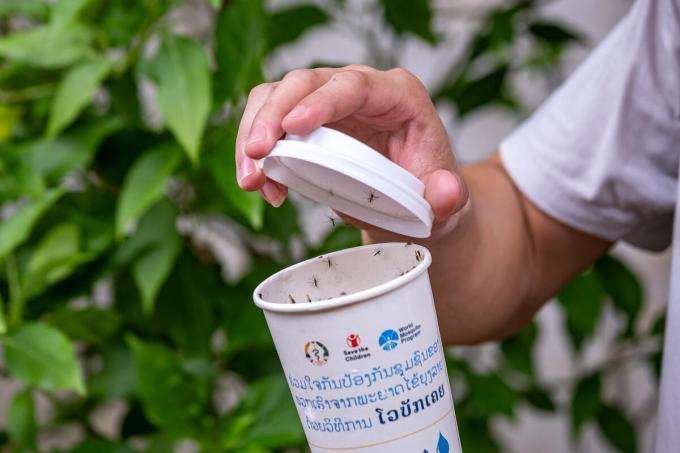The second phase of the life-saving project aimed at preventing dengue transmission in Lao PDR will commence soon

In an effort to support the Government of Laos to reduce the transmission of dengue and other mosquito borne diseases in Vientiane and dengue hotspots in Laos, the Australian Government, the Gillespie Foundation, Save the Children International (SCI) in Laos and the World Mosquito Program (WMP) will invest AUD3.7 million to scale up an exciting Australian innovation.
Developed by the World Mosquito Programme at Monash University in Australia, the programme involves releasing mosquitoes carrying the Wolbachia bacteria, which help decrease the spread of dengue and other diseases transmitted by mosquitoes. The Wolbachia bacteria is natural and harmless to ecosystems and humans.
Dengue ranks among the ten most significant global health risks according to the World Health Organisation and is spreading rapidly. Outbreaks of this disease stress health care systems, cause economic and educational losses, and inequitably harm children and women the most. The incidence of dengue is increasing globally due to changes in climatic conditions, increasing urbanisation and limited effectiveness of current mosquito control methods. Every year, an estimated 400 million dengue virus infections occur globally.
In the Lao PDR, dengue is one of the biggest infectious disease problems following a significant surge in dengue cases in 2019, reaching a historical peak of 39,091 reported cases and 76 fatalities, the country faced another substantial outbreak in 2022, with 33,103 reported cases, resulting in 24 deaths. Furthermore, in 2023, Laos documented 35,317 cases, with 20 fatalities. Reported case numbers are known to underestimate the true dengue disease burden, and several studies have estimated that around 100,000 dengue cases occur on average each year across the country.
The Wolbachia method averts dengue cases amongst all members of a community. Dengue is considered highest among children and young adults in the Lao PDR, and girls are more likely to die from severe dengue than boys. Furthermore, the burden of caring for family members with dengue also falls on women.
Director General at the Department of Communicable Disease Control, Lao Ministry of Health, Dr Rattanaxay Phetsouvanh, said “Over the last three decades, the Lao PDR has applied several approaches for dengue vector control. For instance, vector source reduction including the use of chemical insecticide, but prevalence of dengue remains a key issue to be addressed.” He added, “We hope that the Wolbachia project will be successful and yield satisfactory results. If so, we are ready to support the project’s expansion to other cities and provinces of Laos.”
Australian Ambassador to the Lao PDR, Megan Jones said “Australia’s partnership with Laos is built on 72 years of diplomatic relations. Australia is pleased to work with the Ministry of Health, Save the Children International in Laos and World Mosquito Programme to scale-up an effective Australian-developed innovation to reduce the incidence of dengue. The pilot phase has provided the template for the expanded programme and future success.”
Country Director of Save the Children International in Laos, Luke Ebbs said “Save the Children is proud to be partnering with the Governments of Laos and Australia, World Mosquito Programme, and local communities to introduce this life saving project to Laos. The Wolbachia method has been proven safe and effective in other countries in the region and provides a tried and tested solution for reducing death and illness caused by dengue fever and other mosquito borne diseases.”
In 2022, SCI together with Ministry of Health, WMP and local communities implemented Phase 1 of the release of Wolbachia-carrying Ae. Aegypti. in Laos across 9.4km2 of Vientiane (32 villages in Chanthabouly and Xaysettha districts). The Wolbachia method, a unique innovation of WMP, introduces a bacterium called Wolbachia into mosquito populations – to reduce transmission of dengue, chikungunya, Zika and yellow fever viruses. When these mosquitos breed with the local mosquito population over several generations, almost all mosquitos get the Wolbachia bacteria, and cases of dengue significantly reduce. The method was pioneered by Australian scientists at Monash University and is now being deployed by WMP in 14 countries, including Indonesia, Vietnam and Sri Lanka. The most recent of which is the gold standard randomised controlled trial in Yogyakarta, Indonesia that show a 77 percent reduction in dengue incidence in Wolbachia release areas compared to control areas.
To contribute to a reduction of dengue transmission in the Lao PDR and support the national goals outlined in the National Dengue Action Plan, Phase 2 of Wolbachia mosquito release will start in June 2024 and be undertaken over 36 months, in Vientiane, the capital of Laos.
Before releasing, SCI will engage key stakeholders and local communities to raise awareness about the Wolbachia method, address concerns and gain support through gender-equitable, inclusive and integrated social behaviour change approaches. Community engagement approaches will facilitate inclusive community consultations, ensuring the participation of women, people with disabilities, and other marginalised groups. The public health impact of the Wolbachia project will be monitored through the existing health surveillance system. A time series analysis will be undertaken to compare the distribution of reported dengue cases prior to and after the completion of Wolbachia mosquito releases, in the intervention areas compared with a predefined control area(s).
 Laos
Laos